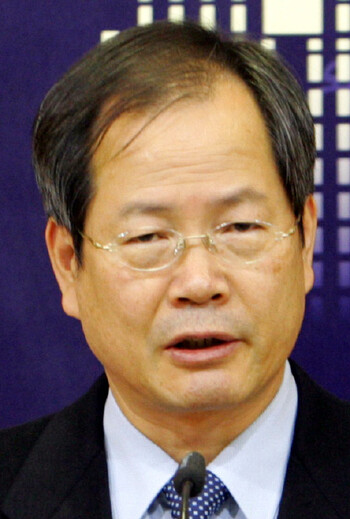hankyoreh
Links to other country sites 다른 나라 사이트 링크
Former Blue House official says no need to delay transfer of wartime control

By Park Hyun, Washington correspondent and Kim Kyu-won, staff reporter
“There will not be any great security risk even if wartime operational control is transferred to South Korea as scheduled,” said Chun Yung-woo, who served as the Blue House senior secretary for diplomacy and security under former president Lee Myung-bak until February. “Whether or not North Korea poses a nuclear threat, we have taken measures so that there will not be a problem even if the operational control is transferred to Korea.”
Chun made the comments in an interview with a Hankyoreh reporter on July 17. He was in Washington, D.C. to attend a seminar organized by the United States Institute of Peace.
When asked his opinion on again delaying the transfer of operational control, Chun said, “I don’t think that any great security risk will be created if operational control is transferred as planned. I see this as an issue of political judgment, not military judgment.”
“Whether or not North Korea poses a nuclear threat, we have taken measures so that there will not be a problem even if the operational control is returned to Korea,” Chun said, when asked for his thoughts on the argument that North Korea’s increased nuclear threat is why the transfer of operational control is being discussed again.
“Even if operational control is transferred to South Korea, we have already designed a number of command systems that would work flawlessly and which would be basically the same as the joint military control.”
“Transferring wartime operational control is a question of whether you have a joint or dual command structure,” Chun said. “But even if there were a dual command structure, it would not cause a fundamental difference in our ability to wage war. The US and South Korean forces would be discussing everything anyway.”
“If operational control is transferred to South Korea, the US ground forces would receive orders from the ROK army, and the air force, which is most important in the early phases of a conflict, would be commanded by the US air force command.”
“While the joint command system might be a little more coordinated in its responses in an emergency situation, South Korean soldiers need to have the attitude that they are responsible for defending their country,” Chun said. “The attitude that the US will take care of everything is problematic.”
When asked about the American response, Chun said, “The US will probably not really like the idea of delaying the transfer of operational control. They will probably want to hurry the transfer.”
“The question of whether operational control will be transferred is not a big deal to the US.”
Meanwhile, Minister of National Defense Kim Kwan-jin said during a special consultative meeting between government and the ruling Saenuri Party (NFP) that was held in the National Assembly on July 18, “A discussion is taking place inside the US government about our proposal. There has not yet been any detailed discussion between the two countries. We will begin this discussion when preparations are complete.”
It was Kim who made the proposal to the US around March that the transfer of wartime operational control be delayed.
“The security situation today is different from 2007, when the US and South Korea agreed to the transfer of wartime operational command,” the Ministry quoted Kim as saying in explanation of why he suggested delaying the transfer. “Back then, we assumed that the nuclear issue was going to be resolved, but now things are more serious. South Korea and the US need to look at this plan again.”
Please direct questions or comments to [english@hani.co.kr]

Editorial・opinion
![[Column] Season 2 of special prosecutor probe may be coming to Korea soon [Column] Season 2 of special prosecutor probe may be coming to Korea soon](https://flexible.img.hani.co.kr/flexible/normal/500/300/imgdb/original/2024/0426/3317141030699447.jpg) [Column] Season 2 of special prosecutor probe may be coming to Korea soon
[Column] Season 2 of special prosecutor probe may be coming to Korea soon![[Column] Park Geun-hye déjà vu in Yoon Suk-yeol [Column] Park Geun-hye déjà vu in Yoon Suk-yeol](https://flexible.img.hani.co.kr/flexible/normal/500/300/imgdb/original/2024/0424/651713945113788.jpg) [Column] Park Geun-hye déjà vu in Yoon Suk-yeol
[Column] Park Geun-hye déjà vu in Yoon Suk-yeol- [Editorial] New weight of N. Korea’s nuclear threats makes dialogue all the more urgent
- [Guest essay] The real reason Korea’s new right wants to dub Rhee a founding father
- [Column] ‘Choson’: Is it time we start referring to N. Korea in its own terms?
- [Editorial] Japan’s rewriting of history with Korea has gone too far
- [Column] The president’s questionable capacity for dialogue
- [Column] Are chaebol firms just pizza pies for families to divvy up as they please?
- [Column] Has Korea, too, crossed the Rubicon on China?
- [Correspondent’s column] In Japan’s alliance with US, echoes of its past alliances with UK
Most viewed articles
- 1‘We must say no’: Seoul defense chief on Korean, USFK involvement in hypothetical Taiwan crisis
- 2N. Korean delegation’s trip to Iran shows how Pyongyang is leveraging ties with Moscow
- 3[Column] Season 2 of special prosecutor probe may be coming to Korea soon
- 4‘Weddingflation’ breaks the bank for Korean couples-to-be
- 5[Column] Has Korea, too, crossed the Rubicon on China?
- 6[Editorial] New weight of N. Korea’s nuclear threats makes dialogue all the more urgent
- 7[Reportage] On US campuses, student risk arrest as they call for divestment from Israel
- 8Korea sees more deaths than births for 52nd consecutive month in February
- 9[Column] Park Geun-hye déjà vu in Yoon Suk-yeol
- 10[Guest essay] The real reason Korea’s new right wants to dub Rhee a founding father